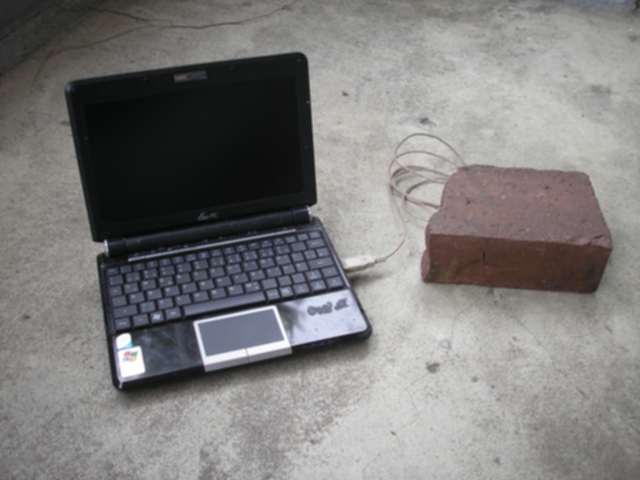- Development Setup
- Just for Windows: Open a Windows Explorer windows, select "Tools -View" and set the options
- "(x) Show Hidden files and Folders"
- "[_] Hide file extensions for known file types"
- "[_] Hide protected operating system files"
- Just for Windows: Open a Windows Explorer windows, select "Tools -View" and set the options
- Firmware Development
- Brick Server
- The Brick Server shows a device which is not attached, by simulation of a device on the PC server.
- The Brick Client with its visual interfaces and data visualisation supports devices of the Brick Firmware project
- Brick Firmware
- In the first stage, every team member implements his/her own Brick Firmware.
- In a later stage, the development branches are united and standardized.
- The simulated device on the PC server can drive useful PC server hardware, e.g. sound, joystick and MIDI port.
- Brick Server
- Organisation Setup & Marketing
- Setup of web accounts
- *GitHub Organisation: http://www.github.com/brickfirmware
- This Gist
- SourceForge
- Facebook Page http://www.facebook.com/brickfirmware
- Google
- Google+ Community http://plus.google.com/u/0/communities/112922770032778829653
- Google + http://plus.google.com/112977238202577403696
- Google+ Page http://plus.google.com/107828116444899532762/
- YouTube Channel http://www.youtube.com/user/brickfirmware
- LinkedIn Group http://www.linkedin.com/groups?gid=8146446
- Pinterest http://www.pinterest.com/brickfirmware/
- Read the Docs
- Profile "Brick Firmeware" http://www.readthedocs.org/profiles/brickfirmware/
- Read the Docs, Project "Brick Firmeware" of profile "Brick Firmeware" http://www.readthedocs.org/projects/brick-firmware/
- Read the Docs, ShortURL "Brick Firmeware" http://www.brick-firmware.readthedocs.org/
- Read the Docs, ShortURL "Brick Firmeware" http://wwww.brick-firmware.rtfd.org/
- Read the Docs, Post Commit Hook "Brick Firmeware" http://www.readthedocs.org/build/brick-firmware
- SlideShare http://www.slideshare.net/brickfirmware
- Trello http://www.trello.com/brickfirmware
- Twitter "Brick Firmware, @brickfirmware" http://www.twitter.com/brickfirmware , #brickfirmware
- Vimeo http://vimeo.com/brickfirmware
- Setup of automatic contents Deployment -RSS Feed from ? to Twitter, Facebook, LinkedIn,....
- Business Development
- Gründer-Garage Idee #732 http://www.gruender-garage.de/members/hemmerling/ideas/my-ideas/732/
- Setup of web accounts
Just-IT people ( e.g. IT students, IT experts, hobbyists...) can write Java / Python/ c# Script to control embedded microcontroller hardware, by accessing a web server running on their own PC by HTTP/REST, while the webserver written in Java, communicates over USB cable, by a simplified compressed TCP/IP protocol, with special microcontroller boards.
All software is OpenSource.
The buiness model of Tinkerforge is to sell special hardware ( microcontroller boards, sensors,..) so that these untrained just-it people can handle embedded systems WITHOUT C programming, and by the special hardware ( look at the shop ), WITOUT soldering, they just click interface cables together, by a simple system, so that just-it people ( or engineers with little time ) can build laboratory protoypes of data acquisition and control systems
We want the Brick Daemon work with given third-party microcontroller boards :-).
- One of the founders of the project, graduated electric engineer Rolf Hemmerling, went to about 30 hands-on workshops by MCU manufacturers, with focus ARM, e.g. ST, TI, Freescale, Atmel, and some others, and mostly he got free or subventioned boards.
- while one participant from India, also graduated electric engineer, has some 8-bit micrcontroller boards ( PIC18, 8051 ),
- and another participant from India is "just" PC software expert.
So if you own an embedded board with an MCU similar to
ATSAM3S4C with 256 Kbyte Flash ROM, 48 KBytes SRAM.
http://www.atmel.com/devices/sam3s4c.aspx
or even less ( bare metal board, the Tinkerforge crew just starts with a true Linux board ), then you might join. Maybe even boards with much less RAM may work, thats one of the goals to find out the minimum RAM requirement.
Your board must not be ARM, can be Coldfire, Microchip Pic, Renesas,.. anything goes, its up to you to implement your own "Brick Firmware" for your board and MCU.
Alernatively you might try to make the "Brick Daemon" work without microcontroller boards, so making the PC itself ( or another PC in the Internet / Intranet ) an embedded device.

